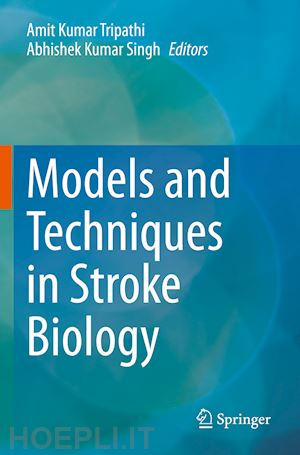
Questo prodotto usufruisce delle SPEDIZIONI GRATIS
selezionando l'opzione Corriere Veloce in fase di ordine.
Pagabile anche con Carta della cultura giovani e del merito, 18App Bonus Cultura e Carta del Docente
This book summarizes various tools and techniques used to provide insights into the cellular and molecular pathophysiology of stroke. It also presents rodent animal models to help shed light on the pathophysiology of ischemic stroke.
Presenting the latest information on the different types of stroke, including embolic, filament, photothrombotic, and bilateral common carotid artery, the book also describes techniques that are used for confirmation of stroke surgery, such as laser speckle imaging (LSI) and laser Doppler flowmetry (LDF), and discusses the non-human primates that are used in stroke surgery, cerebral venous sinuous thrombosis, and neurobehavioral assessment. Lastly, it analyzes various neuroprotective agents to treat and prevent ischemic stroke, and examines the challenges and advances in treating and preventing acute ischemic stroke.Dr. Amit Kumar Tripathi is a post-doctoral scientist at the School of Biomedical Engineering, Indian Institute of Technology (Banaras Hindu University). He completed his PhD in Endocrinology from CSIR-Central Drug Research Institute, Lucknow, and the Department of Biochemistry, Jamia Hamdard, New Delhi. His doctoral research focused on mechanistic studies to understand neuroprotection and therapeutic targets. He has ten years of research experience in the field of rodent models of various neurosurgical techniques, such as for transient middle cerebral artery occlusion (tMCAO) and cerebral venous sinuses thrombosis (CVS). He has published his research in several peer-reviewed international journals, including the Journal of Biomedical Science and Circulation Research. He is a member of several international scientific societies, including the International Society for Neurochemistry and Society of Toxicology India.
Dr. Abhishek Kumar Singh is an Assistant Professor at Amity Institute of Neuropsychology and Neurosciences, Amity University, Noida, where he has established the state-of-the-art Laboratory for Stem Cell Biology and Neuroscience. He has received his PhD from the CSIR-Indian Institute of Toxicology Research, Lucknow and Department of Biotechnology, Jamia Hamdard, New Delhi, in 2013.
Dr. Singh has published several research articles in respected international journals and book chapters. He is a member of various international scientific societies, including the Indian Academy of Neuroscience and Society of Toxicology India.











Il sito utilizza cookie ed altri strumenti di tracciamento che raccolgono informazioni dal dispositivo dell’utente. Oltre ai cookie tecnici ed analitici aggregati, strettamente necessari per il funzionamento di questo sito web, previo consenso dell’utente possono essere installati cookie di profilazione e marketing e cookie dei social media. Cliccando su “Accetto tutti i cookie” saranno attivate tutte le categorie di cookie. Per accettare solo deterninate categorie di cookie, cliccare invece su “Impostazioni cookie”. Chiudendo il banner o continuando a navigare saranno installati solo cookie tecnici. Per maggiori dettagli, consultare la Cookie Policy.